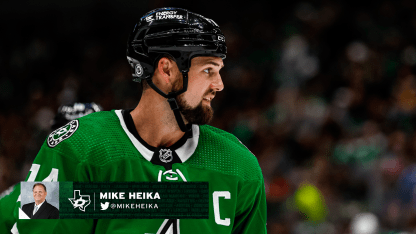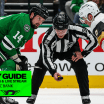The Stars have experienced the natural growth process of developing a versatile team.
After a few years of offensive struggles, the front office brought in new head coach Pete DeBoer and tasked him with finding a way to squeeze more goals out the group. When DeBoer and his coaching staff started digging deep into the innards of the organization, they discovered that tossing out the strong defensive structure which had been built over several seasons would be a mistake. So they began the process of establishing an identity that could both create more opportunities and prevent the opposition from scoring.
It's a great plan in today's hockey world and it worked perfectly for a couple of months.
The challenges of playing a well balanced game
The Stars rank 26th in goals against for the month of March at 3.64, yet rank first in goals for with 4.73 per game

Dallas shot out of the gate and by Jan. 1 had the fourth best record in the league at 23-9-6. The Stars ranked third in scoring at 3.61 goals per game and were sixth in GAA at 2.68. You really couldn't ask for a better transition. Unfortunately, some of the old concerns started to curse the team in January and February.
This has been a "hard scoring" team for a few years, where they create all sorts of opportunities but then fail to finish and players like Joe Pavelski, Tyler Seguin, Radek Faksa and Luke Glendening were being bit by a snake or two. Jason Robertson, Miro Heiskanen and Roope Hintz also slowed down, and even newcomers like Mason Marchment and Ty Dellandrea struggled at times to get out of slumps.
Bottom line, Dallas ranked 28th in scoring for January and February at 2.50 goals per game and the record sunk to 8-7-7 (18th in that span).
A strong defensive core and great goaltending carried them during this stretch. Dallas ranked third in goals against at 2.45, which helped prevent a full-on panic.
Still, the scorers wanted to score, and everyone got tired of the same old questions, so some tweaks were made. The additions of Evgenii Dadonov and Max Domi helped, and the team started playing a more aggressive brand of hockey. In 11 games in March, Dallas leads the NHL in scoring at 4.73 goals per game. It's been fun, with Robertson, Heiskanen, Wyatt Johnston and Jamie Benn all drawing statistical praise for their offensive ability. The team is finding ways to outscore its problems with a 7-3-1 record and has displayed an incredible ability to stay in every game.
However, this has come at a cost.
Dallas ranks 26th in goals against for the month of March at 3.64, and Oettinger looks frazzled. He blamed himself after a 5-4 overtime loss to Seattle on Tuesday and the organization has clearly had internal discussions on how they can better support their 24-year-old backstop.
"He's playing a lot of hockey and doing a lot of traveling and it's tough," DeBoer said after Tuesday's loss. "We're asking a lot of him and we've got to help him out. And for me, giving up some of those 2-on-1s and looks we gave up, that's on us."
Backup goalie Scott Wedgewood is battling a knee injury and his date of return keeps getting pushed back. It's no coincidence the acquisition of Wedgewood last season helped Oettinger through a rough patch. AHL goalies Matt Murray and Remi Poirier are options, but the coaching staff has been hesitant to turn to them too much. So, if Oettinger has to continue this workload, it means the team in front of him must get better at limiting chances.
It's ironic this same group had to find a way to "loosen up" to break out of its slump and now must reverse that trend, but it makes sense in this strange season. In recent games, the defensemen have made numerous mistakes in coverage or in decision-making. Jani Hakanpää was minus-4 on Tuesday, Ryan Suter made some obvious mistakes and same with Esa Lindell.
The coaching staff has decided to use Joel Hanley in recent games while scratching Nils Lundkvist. But even they got experimental after losses in Vancouver and Edmonton and used a seven-man rotation against Calgary last week. It didn't work, but it displayed that the coaches are looking for solutions.
Up front, the forwards are scoring, but they also are taking a lot of chances. Robertson overstayed some shifts on Tuesday, including the game-winning goal against. He also was credited with a team-leading five giveaways. Both Domi and Dadonov are more prone to blind passes, but that is part of the transition process to a new team.
The bottom line though is things need to tighten up.
Dallas has 11 games remaining in the season and could realistically land in any one of the top three spots in the Central Division. That means there's still a lot on the line in the rest of the season. But just as important as playoff positioning is having your game in order. The Stars haven't had to deal with injuries for much of the year, so working around the absence of Seguin (leg laceration), Marchment (knee) and Wedgewood (knee) is something other teams have been doing all year. Wedgewood might be the most impactful loss, but until he gets back the team has to be better at protecting Oettinger.
They also need to find a consistent playoff identity.
It has been an odd season, with long road stretches and, at times, too much home cooking. It has been a year in which the Stars have dealt with both drought and deluge when it comes to scoring. It has been a year where this team has been all over the map.
But now is the time to find a simpler, quieter game.
And it will take the entire organization to do so.
This story was not subject to the approval of the National Hockey League or Dallas Stars Hockey Club.
Mike Heika is a Senior Staff Writer for DallasStars.com and has covered the Stars since 1994. Follow him on Twitter @MikeHeika.


















